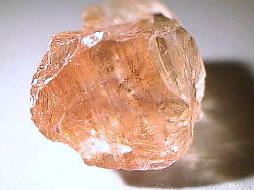Chemistry:Sunstone
| Sunstone | |
|---|---|
 | |
| General | |
| Category | Tectosilicate minerals, feldspar group, microcline or oligoclase variety |
| Formula (repeating unit) | (Ca,Na)((Al,Si)2Si2O8) |
| Crystal system | Triclinic |
| Identification | |
| Color | Colorless, orange, yellow, red, green, blue, brown, and copper shiller |
| Crystal habit | Euhedral crystals, granular |
| Twinning | Lamellar |
| Cleavage | 001 |
| Mohs scale hardness | 6.0–6.5 |
| Diaphaneity | Transparent to translucent and opaque |
| Specific gravity | 2.64–2.66 |
| Refractive index | 1.525–1.58 |
Sunstone is a microcline or oligoclase feldspar, which when viewed from certain directions exhibits a spangled appearance. It has been found in Southern Norway, Sweden, various localities in the United States, and on some beaches along the midcoast of South Australia.
Properties
Physical properties

The optical effect is due to reflections from inclusions of red copper, hematite, or goethite, in the form of minute scales, which are hexagonal, rhombic, or irregular in shape, and are disposed parallel to the principal cleavage-plane. These inclusions give the stone an appearance something like that of aventurine, hence sunstone is known also as "aventurine-feldspar". The optical effect is called schiller and the color of Oregon Sunstone is due to copper. The middle part of this crystal sparkles, and usually the color is darkest in the middle and becomes lighter toward the outer edges.
The feldspar which usually displays the aventurine appearance is oligoclase, though the effect is sometimes seen in orthoclase: Hence two kinds of sunstone are distinguished as "oligoclase sunstone" and "orthoclase sunstone".
Distribution
Sunstone was not popular until recently.[when?] Previously the best-known locality being Tvedestrand, near Arendal, in south Norway, where masses of the sunstone occur embedded in a vein of quartz running through gneiss.
Other locations include near Lake Baikal in Siberia, and several United States localities – notably at Middletown Township, Delaware County, Pennsylvania; Plush, Oregon; and Statesville, North Carolina.
The "orthoclase sunstone" variant has been found near Crown Point and at several other localities in New York, as also at Glen Riddle in Delaware County, Pennsylvania, and at Amelia Courthouse, Amelia County, Virginia.
Sunstone is also found in Pleistocene basalt flows at Sunstone Knoll in Millard County, Utah.[1]
Oregon sunstone

A variety known as "Oregon sunstone" is found in Harney County, Oregon and in eastern Lake County north of Plush. Oregon Sunstone contains elemental copper.[2] Oregon Sunstone is unique in that crystals can be quite large. The copper leads to variant color within some stones, where turning one stone will result in manifold hues: The more copper within the stone, the darker the complexion.[3]
On 4 August 1987, the Oregon State Legislature designated Oregon Sunstone as its state gemstone by joint resolution.[4]
Andesine controversy
In the early 2000s, a new variety of red or green gemstone resembling sunstone and called "andesine" appeared in the gem market. After much controversy and debate, most of these gemstones, allegedly sourced from China, were subsequently discovered to have been artificially colored by a copper diffusion process.[5] A Tibetan source of bona fide (untreated) red andesine, however, was eventually verified by a number of independent groups of well-respected gemologists.[6][7][8][9][10]
See also
References
- ↑ "Sunstones at Sunstone Knoll, Millard County". http://geology.utah.gov/utahgeo/rockmineral/collecting/sunstone.htm.
- ↑ Hofmeister, A.M.; Rossman, G.R. (1985). "Exsolution of metallic copper from Lake County labradorite". Geology 13: 644–647.
- ↑ "Oregon sunstone – official state gemstone". http://www.naturenw.org/rock-sunstone.htm.
- ↑ Oregon Revised Statutes (Legislation). 2017.
- ↑ "Three occurrences of Oregon sunstone". http://www.gia.edu/gems-gemology/FA13-oregon-sunstone-pay.
- ↑ Huges, Richard W. (14 November 2011). "Tibet andesine mines; Part 2". RWH Publishing. http://www.ruby-sapphire.com/tibet-andesine-guide.htm.
- ↑ Huges, Richard W. (3 November 2010). "Tibet's andesine mines [Part 1"]. RWH Publishing. http://www.ruby-sapphire.com/tibet-andesine.htm.
- ↑ Abduriyim, Ahmadjan (10 September 2009). "A mine trip to Tibet and Inner Mongolia: Gemological study of andesine feldspar". Bangkok, TH: Gemological Institute of America in Thailand (GIA Thailand). http://www.giathai.net/pdf/Red_Feldspar_2009_Abduriyim.pdf.
- ↑ Abduriyim, Ahmadjan (2009). "The characteristics of red andesine from the Himalaya Highland, Tibet". The Journal of Gemmology 31 (5–8): 134–150. doi:10.15506/JoG.2009.31.5.283. http://www.docs.i-version.com/iversion/download.aspx?id=Y2FAL5G6J&start=134&end=150.
- ↑ Abduriyim, Ahmadjan; Kobayashi, Taisuke (2008). "Visit to andesine mines in Tibet and Inner Mongolia; Gemological properties of andesine collected in Tibet and Inner Mongolia". Gems & Gemology 44 (4): 369–373. doi:10.5741/GEMS.44.4.369. http://www.gia.edu/cs/Satellite?blobcol=gfile&blobheader=application%2Fpdf&blobheadername1=Content-Disposition&blobheadername2=MDT-Type&blobheadername3=Content-Type&blobheadervalue1=attachment%3B+filename%3DGG-Gem-News-International&blobheadervalue2=abinary%3B+charset%3DUTF-8&blobheadervalue3=application%2Funknown&blobkey=id&blobtable=GIA_DocumentFile&blobwhere=1355958164226&ssbinary=true.
![]() This article incorporates text from a publication now in the public domain: Chisholm, Hugh, ed (1911). "Sunstone". Encyclopædia Britannica. 26 (11th ed.). Cambridge University Press. p. 110.
This article incorporates text from a publication now in the public domain: Chisholm, Hugh, ed (1911). "Sunstone". Encyclopædia Britannica. 26 (11th ed.). Cambridge University Press. p. 110.
External links
 |
